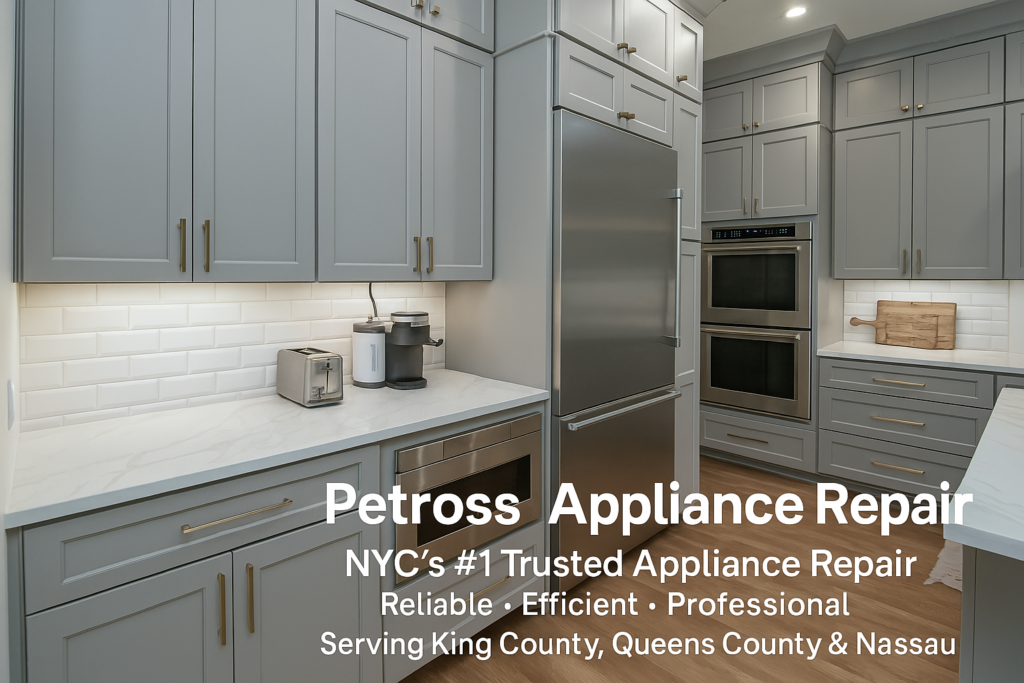The Importance of Hiring Certified Appliance Technicians in NYC

Summary: In New York City’s complex environment, hiring a certified appliance technician is not just a matter of convenience – it’s a vital step to ensure safety, quality service, and legal compliance. Certified technicians bring proven expertise and adhere to NYC’s strict regulations, giving homeowners and property managers peace of mind. In this post, we explore why certification matters in NYC specifically, from the quality of workmanship and safety assurances to meeting local licensing laws, building codes, co-op/condo policies, and even insurance requirements. We also provide tips on how to verify a technician’s credentials before you hire.
Why Certification Matters for Appliance Repair in NYC
A certified appliance repair technician offers a guarantee of skill and knowledge. Certification typically means the technician has undergone training and passed exams to prove their expertise (What You Should Know Before Hiring an Appliance Repair Technician? | Education). For a city like New York, where buildings are densely packed and systems (electrical, gas, water) are highly regulated, this expertise is crucial. Here’s why certification is so important:
Quality of Service: Certified technicians are trained to diagnose and fix appliances correctly. Their extensive training means they are familiar with a wide range of brands and models, and stay updated on the latest appliance technologies (The Importance of Hiring a Licensed Appliance Repair Technician – Gulf Coast Appliance Repair). This results in accurate troubleshooting and effective repairs, often getting the job done right the first time. As one guide puts it, “A certified technician is like a guarantee that your appliances are in safe hands” (What You Should Know Before Hiring an Appliance Repair Technician? | Education). In a city where time is precious and callbacks are a hassle, quality workmanship is a major benefit.
Safety Assurance: Safety is paramount when it comes to appliance installation and repair – especially in NYC’s apartment buildings where a single mishap can endanger many people. Certified technicians are trained to handle electricity and gas safely, reducing risks of shock, fires, or leaks. Improper appliance work can lead to serious hazards: for example, a poorly installed gas stove or dryer could result in gas leaks or even carbon monoxide poisoning. NYC’s fire department statistics show that appliances are a notable cause of home fires (about 8% of accidental fires in one recent year were attributed to appliances) (New York City Fires Are Still Common | Hofmann & Schweitzer). A certified tech will know how to prevent such dangers – by ensuring proper gas connections, correct electrical wiring, and adequate venting. As a safety reminder, New York City building code requires that any work involving natural gas lines (like installing or relocating gas stoves, dryers, boilers, etc.) be performed by a Licensed Master Plumber (Appliance Installations that Require a Licensed Master Plumber – Empire Plumbing NYC) (Appliance Installations that Require a Licensed Master Plumber – Empire Plumbing NYC). In other words, a “handyman” without the proper license has no business hooking up your gas appliances. Hiring a properly certified and licensed professional isn’t just good sense – in many cases, it’s the law (more on that below).
Legal Compliance in NYC: New York City has strict licensing requirements for anyone doing appliance repairs. In fact, individuals or businesses that repair electronic equipment or home appliances in NYC are required to have an “Electronic & Home Appliance Service Dealer” license from the NYC Department of Consumer and Worker Protection (DCWP, formerly the Department of Consumer Affairs) (Top Appliance Repair in New York City, NY – Uhire) (Top Appliance Repair in New York City, NY – Uhire). This local license is mandatory regardless of whether the work is done in your home or at a shop, and it signifies that the technician or company has registered with the city and met basic requirements (like background checks and insurance). If a technician isn’t licensed in NYC, they are operating illegally – which is a huge red flag. In addition, federal law requires EPA certification for any technician handling refrigerants (e.g. fixing refrigerators or air conditioners) (Top Appliance Repair in New York City, NY – Uhire). Failing to comply with these local and federal certification laws can lead to criminal and civil penalties, including city fines up to $500 per violation (Top Appliance Repair in New York City, NY – Uhire). For the consumer, hiring an unlicensed repairman could mean inadvertently participating in illegal activity. Moreover, you lose the protections that come with a licensed professional. In short, certification and licensing aren’t optional in NYC – they’re required by law to protect residents.
Accountability and Trust: Certification builds trust between the service provider and customer. A certified (and NYC-licensed) appliance technician has a reputation and credentials to uphold. They are far more likely to be insured and bonded, follow proper procedures, and provide receipts or documentation for their work. If something goes wrong or if you have a dispute, a licensed technician can be held accountable through regulatory bodies. In NYC, licensed contractors are subject to oversight by DCWP – meaning you can file a complaint with the city if the service was not up to par, and the agency can mediate or take action. (By contrast, if you hire an unlicensed individual, you’re largely on your own if they botch the job.) Property managers in NYC say that hiring licensed and insured contractors is essential; otherwise liability can fall on the building or owner (What Boards Should Know About Contractor Licensing – A License to Build – CooperatorNews New York, The Co-op & Condo Monthly) (What Boards Should Know About Contractor Licensing – A License to Build – CooperatorNews New York, The Co-op & Condo Monthly). The peace of mind that comes from knowing your technician has verified credentials and a city license number is well worth it. It’s one reason many co-op boards and management companies in New York will only allow properly licensed and certified workers into their buildings.
Quality Parts and Warranty Protection: Certified technicians often have access to genuine replacement parts and are knowledgeable about warranty compliance. Many appliance manufacturers stipulate that repairs must be done by authorized or certified technicians to keep the warranty valid (The Importance of Hiring a Licensed Appliance Repair Technician – Gulf Coast Appliance Repair). If you unknowingly hire someone unqualified to fix your high-end refrigerator and they damage it further, you could also end up voiding your manufacturer warranty – leaving you on the hook for all future costs. Certified techs will perform repairs to manufacturer standards, using proper parts, so you maintain coverage. They also typically stand by their work with guarantees. For instance, reputable NYC appliance repair companies will offer a workmanship warranty, promising to come back free of charge if the problem isn’t resolved, which is another layer of trust and protection for you.
NYC-Specific Considerations (Building Codes, Unions, and Policies)
New York City’s housing stock and regulations add extra reasons to insist on certified technicians:
Strict Building Codes & Permits: NYC’s building and fire codes are some of the strictest in the country, and for good reason – safety in multi-family buildings is critical. Certain appliance-related tasks must be done by a tradesperson with a specific NYC license. We already noted that gas appliance work requires a Licensed Master Plumber. Similarly, any significant electrical work (like running a new circuit for an electric stove or fixing internal wiring on an appliance) may require a Licensed Electrician. Certified appliance techs understand when a job is beyond a simple repair and needs a permit or a different licensed specialist. They will know how to navigate NYC’s permit requirements and ensure the work is done up to code. Unlicensed handymen might ignore these rules, putting you at risk of building violations or unsafe outcomes. There have been severe consequences in NYC for unlicensed work – for example, in the infamous 2015 East Village gas explosion, an illegally installed gas line by an unlicensed contractor led to a massive explosion that destroyed a building and tragically killed two people, resulting in manslaughter convictions for the landlord and the unlicensed plumber involved (2015 East Village gas explosion – Wikipedia) (2015 East Village gas explosion – Wikipedia). The lesson from such incidents is clear: never cut corners with unqualified workers, especially when gas or electrical systems are involved.
Co-op and Condo Requirements: If you live in a co-op or condo, your building’s rules likely require using licensed, insured technicians for any work in your unit. Most NYC co-op boards insist that contractors provide proof of licensing and insurance before they’re allowed on the property (Renovating Your New York City Co-Op? Read This First). This is to protect the building and other residents from risk. If you try to bring in a cheap, uncertified repairman, you might actually be violating your co-op’s alteration or renovation agreement (even if it’s just a “repair,” many buildings treat appliance installations or significant repairs under the same rules). Co-ops also often request a certificate of insurance (COI) from the vendor naming the building as additionally insured – something only legitimate businesses carry. In short, using certified professionals isn’t just good practice, it may be a condition of your lease or ownership in NYC multi-family buildings. Check your house rules or ask the property manager: you’ll likely find that any electrical, plumbing, or appliance work must be done by properly licensed individuals. This protects you as the homeowner as well, because it ensures the person coming in is vetted.
Union and Trade Standards: New York is a union-friendly town, and while most residential appliance repairs aren’t union jobs, the overall environment places a high value on professional credentials. Many certified appliance technicians in NYC have undergone apprenticeships or vocational training. Some may be members of trade organizations or unions (for instance, a large apartment complex’s maintenance crew might have union training in appliance repair). This means they abide by industry standards for safety and workmanship. Even outside of unions, there are professional associations – such as the Professional Service Association (PSA) or International Society of Certified Electronics Technicians (ISCET) – that offer certifications and continuing education. If your appliance tech holds such certifications, it’s a sign they are committed to their craft. NYC’s market is very competitive, so only those techs who continually improve their skills and maintain good reputations tend to thrive. Hiring a certified tech increases the likelihood that the person is serious about their business (not a fly-by-night operation).
Complex Building Systems: NYC buildings, especially high-rises or pre-war constructions, can present unique challenges – from old electrical panels to complicated steam/gas systems. Certified technicians are more likely to be familiar with local building idiosyncrasies. They know, for example, that in some older Manhattan buildings the voltage might fluctuate, or that in a landmarked building you cannot just punch vents through walls. Their experience in NYC equips them to anticipate issues and take appropriate precautions. Quality training plus local know-how is the ideal combination. When you hire someone who’s certified and has NYC experience, you get both.
Insurance and Liability: Protecting Yourself as a Homeowner
One often overlooked reason to hire only certified (and licensed and insured) appliance technicians is liability and insurance protection. If you bring an unlicensed, uninsured person into your home and they get injured or cause damage, you could be held financially responsible. New York Labor Law makes property owners potentially liable for injuries to contractors who aren’t properly insured. That means if a worker hurts themselves fixing your appliance and they have no workers’ compensation, they could sue you for their medical costs and lost wages – and your homeowner’s insurance might not cover it (Hiring an Unlicensed Contractor Puts Homeowners at Risk -John Caravella) (Hiring an Unlicensed Contractor Puts Homeowners at Risk -John Caravella). This is a nightmare scenario every homeowner wants to avoid.
Certified professional technicians, on the other hand, almost always carry general liability and workers’ comp insurance (in fact, NYC licensing requires it). Their insurance would cover any accidental injury or property damage that occurs during the job, sparing you from lawsuits or repair bills. As a homeowner or property manager, you should always verify that the service provider is insured. It’s not impolite – it’s standard practice, especially in NYC. Reputable contractors are happy to provide an insurance certificate.
There’s also the matter of damage to your appliance or home due to faulty work. If an uncertified person fixes your dishwasher and the next day your kitchen floods or an electrical fire starts, you’ll be on shaky ground trying to make an insurance claim. Insurers can argue the damage was due to negligent or unpermitted work and may deny the claim. Even if they don’t outright deny, the lack of a licensed contractor could complicate the process of getting reimbursed. By using a certified technician, you ensure that any work is done to code and is documented – so if something unforeseen does happen, you have a professional company to hold accountable. As one legal expert warns, saving money by hiring an unlicensed contractor “could be very problematic, leading to long-term negative financial effects or legal consequences,” and if they lack proper insurance, the homeowner may end up responsible for on-the-job injuries or damage (Hiring an Unlicensed Contractor Puts Homeowners at Risk -John Caravella). The potential thousands in liability far outweigh any minor savings upfront.
In summary, hiring a certified and licensed technician is part of protecting yourself. It’s not just about the appliance – it’s about your home, your finances, and even your legal liability. New York co-op boards understand this; that’s why they insist on licensed/insured vendors. Homeowners should follow the same wisdom for every repair or project, no matter how small.
How to Verify a Technician’s Certification and Credentials
Knowing the importance of certified technicians is one thing – but how can you as a consumer verify someone’s credentials? Here are actionable steps for homeowners and property managers in NYC to ensure an appliance repair technician is qualified and legitimate:
Ask for their NYC License – In New York City, appliance repair businesses should have a DCWP Electronic & Home Appliance Service Dealer license. Don’t hesitate to ask for the company’s license number. A qualified technician will provide it or show you a copy of their license certificate. You can then independently verify this license on the city’s online database. The NYC Department of Consumer and Worker Protection provides a “Check a License” tool where you can search by business name or license number to confirm it’s valid (Top Appliance Repair in New York City, NY – Uhire). (Simply go to the NYC Consumer Affairs/DCWP website or call 311 for assistance in verifying a home improvement or appliance repair license.) Hiring only licensed vendors is so important that city authorities advise, “Always make sure that your preferred technician is duly licensed” (Top Appliance Repair in New York City, NY – Uhire).
Look for Trade Certifications – Aside from the city business license, many top technicians hold industry certifications. For example, they might be certified by the Professional Service Association (PSA) as a Certified Appliance Professional (CAP), or have credentials from the International Society of Certified Electronics Technicians (ISCET), or a manufacturer’s certification (like being a factory-authorized repair provider for Sub-Zero, Viking, etc.). While these certifications may not be mandatory, they’re a strong indicator of expertise. If a technician mentions they are certified by a manufacturer or trade organization, you can usually verify this through the issuing organization – for instance, by checking on the manufacturer’s website for authorized servicers, or contacting the certifying association (Top Appliance Repair in New York City, NY – Uhire).
Verify Insurance Coverage – Before work begins, ask the technician or the company for proof of insurance. General Liability Insurance and Workers’ Compensation are the key policies. A professional outfit will have no problem emailing you their Certificate of Insurance. Check that the policy is current and has adequate coverage (many co-ops in NYC require at least $1 million in general liability coverage, for example). This step is crucial; as discussed, if they are not insured, any accidents could fall to you. If you’re a property manager or board member, this is likely part of your standard vendor vetting. Homeowners should be just as diligent. As one NYC co-op management advisor put it, “You can’t claim ignorance. It’s your job to know if they are insured and licensed.” (What Boards Should Know About Contractor Licensing – A License to Build – CooperatorNews New York, The Co-op & Condo Monthly).
Check References and Reviews – While not a “certification,” a technician’s track record in NYC is part of their credentials. Look up their online reviews on Yelp, Google, or Angi (Angie’s List). Consistently high ratings and positive feedback about their professionalism is a good sign. You can also ask for references or see if they are rated well by the Better Business Bureau. A certified, licensed tech with a solid reputation will have satisfied customers to vouch for them. Be cautious if you find a pattern of complaints about shady practices or if the technician cannot provide any credible references.
Inquire about Training and Specializations – Don’t be afraid to ask the technician about their background. Where did they receive training? Are they specialized in certain appliance brands or types? A true professional will proudly share their experience, such as having attended manufacturer training sessions or holding a certificate in HVAC or refrigeration if they work on those systems. This conversation not only helps verify their expertise but also builds trust. Someone who can clearly explain their qualifications and the problem/solution for your appliance is likely to be competent and honest. On the other hand, if a person dodges questions about licenses or gets irritated when asked about credentials, consider that a red flag.
By taking these steps, you can filter out unqualified handymen and only hire technicians who will do the job right. In NYC, you have the tools at your disposal – from city websites to building requirements – to double-check anyone who comes to work in your home. It might feel like due diligence, but it’s now a necessary part of being a responsible homeowner or manager. The good news is that most established appliance repair companies in the city know customers care about this and will often advertise that their technicians are “licensed and certified” in their marketing. Still, trust but verify.
Conclusion
When it comes to appliance repairs in New York City, hiring a certified technician is not just an option – it’s the smartest and often the only safe choice. Certified and licensed appliance technicians provide assurance of quality service backed by training and verified knowledge. They prioritize safety, adhering to NYC’s stringent codes to prevent accidents in your home and building. They also navigate the city’s legal requirements so you don’t have to worry about fines or violations. Crucially, working with a certified professional shields you from unnecessary liability and stress, because a reputable tech will be properly insured and accountable for their work.
NYC residents face unique challenges: aging infrastructure in some buildings, tightly packed living spaces, and vigilant co-op boards – all of which make the stakes of any home repair higher. By insisting on a certified appliance repair technician, you are investing in peace of mind. You’re trusting your expensive appliances – whether it’s a fancy refrigerator or a lifesaving gas furnace – to someone who has proven they know what they’re doing. The result is often a longer lifespan for your appliance, better performance, and avoiding the cascade of problems that shoddy work can create.
Summary of Key Benefits of Hiring a Certified Technician:
Safety: Proper handling of gas, electric, and water connections, greatly reducing fire, electrocution, leak, and flood hazards (The Importance of Hiring a Licensed Appliance Repair Technician – Gulf Coast Appliance Repair) (The Importance of Hiring a Licensed Appliance Repair Technician – Gulf Coast Appliance Repair).
Quality & Reliability: Expert diagnostics and repairs that fix the issue correctly, often with a guarantee on workmanship. Less risk of repeat breakdowns.
Legal Compliance: Work done to code and with necessary permits or licenses, so you’re not breaking any laws. NYC-required licenses (like the DCWP appliance repair license) are adhered to (Top Appliance Repair in New York City, NY – Uhire).
Insurance Protection: Technicians carry insurance, protecting you from being liable for accidents or damage during the repair (Hiring an Unlicensed Contractor Puts Homeowners at Risk -John Caravella) (What Boards Should Know About Contractor Licensing – A License to Build – CooperatorNews New York, The Co-op & Condo Monthly).
Warranty and Support: Maintains manufacturer warranties and uses proper parts. If the tech is factory-certified for your brand, you get an added layer of trust and possibly faster access to parts.
Peace of Mind: You have recourse if something isn’t right – through both the company’s service warranty and avenues like NYC’s consumer protection agency – which is something you likely won’t have with an under-the-table handyman.
In a city as large and vibrant as New York, with so much at stake in our homes, it pays to do things the right way. The next time an appliance acts up, take the time to hire a certified appliance technician. It’s an investment in the longevity of your appliances, the safety of your household, and the protection of your property. In the long run, choosing a certified professional isn’t just about fixing a broken appliance today – it’s about safeguarding your home for tomorrow.
Actionable Advice: Always verify the credentials of any service professional you hire in NYC. Use the city’s license lookup (Top Appliance Repair in New York City, NY – Uhire), request proof of insurance, and never feel bad about asking questions. By being a diligent consumer, you’ll encourage higher standards in the industry and ensure you get the quality service you deserve. Your appliances – and your peace of mind – will thank you.




